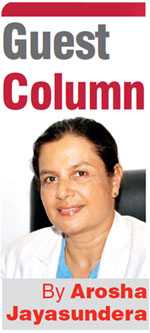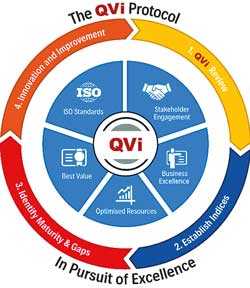Saturday Feb 14, 2026
Saturday Feb 14, 2026
Thursday, 28 March 2019 00:00 - - {{hitsCtrl.values.hits}}
Evbex-Asia CEO and Partner Richard Davies recently visited Sri Lanka to make presentations to the National Chamber of Commerce, the Institute of Facilities Management and to the University of Moratuwa on the subject of Facilities Management (FM).
Whilst in Sri Lanka, he also signed an MOU to partner Asian Institute of Excellence (AIE) CEO Arosha Jayasundera, to bring more depth and his experience in developing the FM sector in Sri Lanka – a relatively new profession and industry, which is expanding quickly to meet the growth in the economy and infrastructure.
Contrary to the perception by many, professional Facilities Management encompasses more than simply providing cleaning and security services. According to Richard Davies, the latest Standard, ISO 41001 Facility Management – Management systems – Requirements with guidance for use, will ensure that service quality and performance is tailor-made for the FM sector.
ISO 41001 is an accreditable Standard, similar to the ISO Management Systems Standards such as environment, health and safety, asset and energy management and will sit in parallel with ISO 9001 which addresses Quality Management in general.
Richard Davies is a member of the Technical Committee (267), responsible for developing the new range of ISO FM Standards
ISO 41001 will help organisations manage, operate and maintain facilities, assets and services in order to meet ever-changing operational requirements in an efficient and effective manner. Facility management (FM) organises disparate stakeholder group requirements and the interrelationships between core business activities and the support services and environments required to meet the demand organisation’s needs.
Implementing ISO 55001 and ISO 41001 can empower organisations to better utilise and manage facilities and assets, focus and optimise activities, and derive the required function and value in order to achieve their objectives. ISO 55001 provides a systematic approach to link value derived from assets with organisational objectives. ISO 41001 provides structure organising facility operations through resource management, value of money, workplace standards, compliance, environmental impact and the overall efficiency and effectiveness of facilities, assets and services satisfying the demand organisation’s needs.
The UK has had a long history in providing leading FM solutions and has evolved accordingly over the last 30 years. It has shifted from the provision of simple single services such as cleaning, maintenance, security and training to bundled services, and Integrated FM services. Today, it is be much more strategically aligned to the core business and supporting organisational future strategy, future workplace, and technology.
FM in nascent in Sri Lanka and is just moving from stage one of the pyramid to stage two. The FM market in Sri Lanka is a very young profession and industry and the qualifications and Institute of Facilities Management were set up only around about 2011 to meet economic and development demands. Today there are still very few corporate FM providers and the existing capabilities of the FM companies are still very limited.
The construction and building industry in Sri Lanka is suffering as a result of the lack of experience and depth in the FM field. The issues arising now in Sri Lanka in the rapidly developing high rise complexes are similar to the challenges faced by the UK market 30 years ago.
With regard to the industry in general, maintenance is considered on a reactive basis only by many organisations. In addition, the handover of construction and installation projects to occupation and operation needs to improve significantly as there are many gaps and issues once the project has been handed over in terms of general maintenance thereafter. Building maintenance currently does not adhere to rigid ‘Standards’ and this would improve from introduction of International Standards and the service specific Standards developed for the UK market.
We also see a dearth of “players” in the local landscape. FM companies currently operating in Sri Lanka include a very limited number of global FM players, four at an Asia Pacific collaboration level, and more operating at a national level.
So how can this industry move to a higher level? This can be achieved by building excellence into FM and learning from 30 years of development and innovation from the UK and other mature FM markets. To achieve this, we need to consider and incorporate other models of Excellence, such as collaborative relationship management, TQM, Lean practices, innovation and continuous improvement.
For example, through improved procurement and tendering alone, for instance, companies can expect to achieve cost savings of circa 10-15%, in addition to achieving best value outcomes, align themselves to a tailored and optimum FM model in terms of meeting the desired business objectives and innovation drivers. An optimum FM model and structure would also enable organisations to manage and administer their FM needs by exception.
The latest thinking and model in FM to assess where a company stands and where it needs to improve, has been designed by Richard Davies himself and is called the Quality-Value index (QVi). This unique process assists the Journey to ‘affordable’ best practice and is a demonstrable method for improving performance and service quality. The model is based on standard Business Improvement Tools & Standards such as EFQM –TQM & Business Excellence, the Lean approach – reduce waste and eliminate errors, ISO 44001: 2017 Collaborative Business Relationships Management and Servqual: Service Quality Gaps & Customer Excellence Standards. The model is based on five critical areas which include customers, relationship, people, FM excellence and innovation.
Following a QVI review, it can be ascertained where a company is positioned according to the FM maturity scale – in one of five categories ranging from poor, unacceptable, satisfactory, good practice and best practice at the top level. With this understanding, areas for further improvements can be identified more precisely. In the medium to long terms, and given the desire, budget and proper planning, the company may aspire to obtain the coveted ISO 41001 certification. However, this is an option and not a necessity and the QVi will in the interim enable them to achieve significant additional value, reduce organisational risk and increase cost savings.
(Arosha Jayasundera can be contacted on [email protected] for further information on FM Services.)